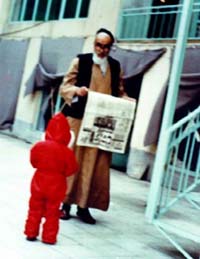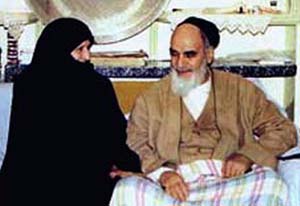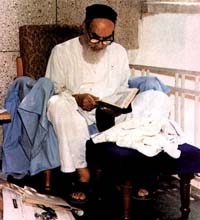When Iran hosted a conference on "Women
and the Islamic Revolution", the participants were provided
an opportunity to visit Imam Khomeini's house. Here one
participant, Khadejah, recounts her impressions.
[Courtesy Crescent International, 1985]

This was a dream come true: a rare privilege to be in
the Imam's home. After many requests, we were informed
one night that a visit had been set for the following
morning: no one could sleep because of the excitement.
The next morning, it was snowing; the streets were blocked,
and we had to wait for the snow to be cleared in order
to reach the Imam's house. In front of the house were
a large number of people queuing in the freezing weather,
just to see him. When we entered Jamran Husseiniyah I
realized what it was to be a Muslim woman. I have never
had such a feeling before, even in my own country.
People had come from different countries, among them
were press representatives, wives of martyrs, and many
other people. Some were crying and shouting 'Allahu Akbar',
their eyes fixed at the door, through which the Imam was
expected to come. Suddenly the Imam appeared. People cried
in excitement, shouted, more this time, 'Allahu Akbar.
Down with America, Israel and Saddam'. The Imam sat down
quietly and beside him sat his son Ahmed. I was barely
one meter away from where the Imam sat, so I could see
him very clearly. His whole face showed complete composure
and an inner peace. Looking at his serene countenance,
I felt as though he were living in another world; only
his eye revealed the fact that he was present in our midst.
Visiting the Imam's house was another surprise for us.
The main door is a simple iron door, leading to a yard
about six meters long. It has three rooms, inside each
of which you will find a mattress and a cushion, and a
simple sofa used by the Imam for sitting and sleeping
on. The kitchen is under the stairs. There is a small
room for him alone for studying, praying, reading and
listening to the news; it is furnished with a chair, a
small table, and some book shelves.

The foreign press correspondents were surprised when
they saw the house of the leader of the Ummah. They were
even more surprised when they saw the Imam's food which
was composed of a boiled potato, an orange, and a small
chunk of bread. They asked the Imam's wife: 'Where do
you sleep?' She answered simply, 'Just where we sit.'
The wife of the Imam described his life. 'He sleeps
from 9 pm until 2 am when he wakes up for the night prayers.
He continues his nawafel prayers until the Adhan for fajr
prayers. He completes his fajr prayer and then waits till
sunrise, when he goes to have his breakfast with his family,
his wife, two daughters (one of them lost her husband
who was martyred at the war front), his son 'Ahmed and
his grandsons. He always eats with them and never alone.
After that he goes to his room to listen to the news and
read the newspapers.'

'At 10 am he receives the officials, members of the
government and others till zuhr prayers. Then he usually
takes a short rest before lunch and then walks for an
hour after that. Some time in the day he spends time with
his family.'
'From the time we were married he has never ordered
me to get him something. If he needs anything, he says
so indirectly. For example, if he needs a shirt, he says:
"Do we have a shirt in the house?" Then I understand that
he needs a shirt, and I get it for him.'
'He insists on preparing things for himself: he prepares
his food, his tea, and washes the cups and puts them back
in the right place. If there is anything wrong he fixes
it himself.'
'One day he was meeting some leaders. He saw that the
light was on in the next room. He went into the room,
himself put the light out and came back to his place.
People were astonished at what he had done.'
'Once he was separating a sheet of two-ply tissue paper.
When someone asked him to use both of them, he replied,
"I only need one of them."'
'He prefers the simplest food, and does not eat from
a variety of dishes at any one meal. He eats only to survive.
This is very important for him, and he is very very organised'.
The Imam respects women very much. For example, when
his grandsons come to visit him, he asks them first of
all to go and see their grandmother and kiss her hand.
There are no servants in his house. The guests are served
by the Imam's family, usually his two daughters who won't
allow their mother to get anything, since they try to
make her life as comfortable as they can.
At the Imam's house we really felt at home, as if we
were among our own family, where one feels safe and secure.
We felt very sad when we had to leave the Imam and his
family who make you feel that they are the living representatives
of the teachings of the Qur'an.
